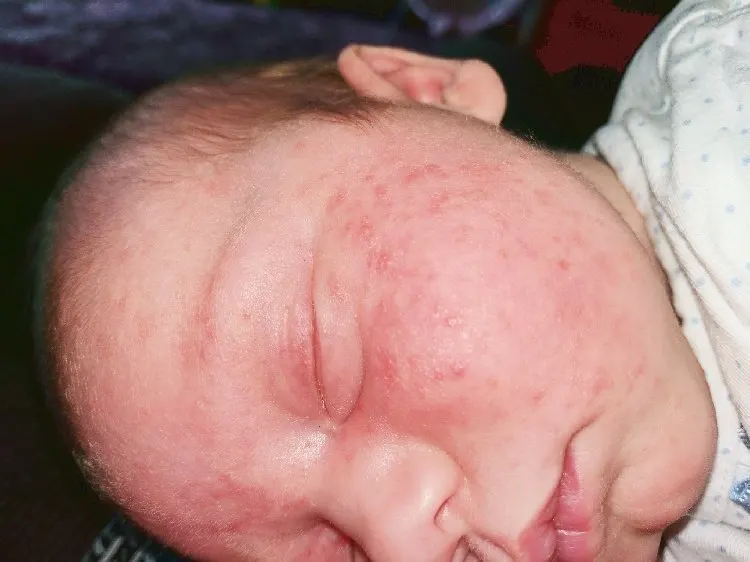[Ad] When your infant presents with the symptoms of an allergy, it can feel very overwhelming to know where to begin to help them. Is your baby allergic to milk, or something else? And how should you manage their symptoms? One thing I wish I’d looked into sooner is probiotics for gut health. Today I’m going to talk to you about exactly this, and one of the best baby probiotics available if you decide to give them a go.

For full disclosure, this article is in collaboration with Cytoplan, a well-respected supplement brand who are happy for me to give you all the information you need to make an informed choice for your infant, and that’s why I’ve chosen to work with them.
If you’ve read any of my other posts about CMPA you’ll know how seriously I take the responsibility of writing about the subject, how passionate I am about advocating for allergy families, and that I would never compromise my integrity within this area.
With that in mind, here’s a balanced look at probiotics, and whether your infant may benefit from them…

What’s the Difference Between Prebiotics and Probiotics?
What Are Prebiotics?
Prebiotics are a source of sustenance for the ‘friendly’ bacteria already living in your gut microbiome. They’re found mostly in plant-based foods like chicory root, garlic, and asparagus, and they promote the growth and activity of beneficial gut bacteria.
Prebiotics include dietary fibres, resistant starches, and polyphenols (a type of phytonutrient). The body is unable to break these down, so they pass to gut microbiota, which uses them to produce short-chain fatty acids (SCFAs) such as butyrate, acetate, and propionate, and vitamins.
What Are Probiotics?
Probiotics on the other hand are edible supplements that contain a source of live bacteria. Probiotic bacteria such as Lactobacillus and Bifidobacterium are critical to good gut health, and are known to be present in the gut flora of healthy babies.

Both prebiotics and probiotics are available to buy, but it’s most beneficial to obtain them from our diet as far as possible.
Of course this is not an option for babies and so, in certain circumstances, probiotics may be beneficial.
Do Probiotics Help Babies With Allergies?
I’m going to be completely transparent here – when Elfin was an infant and we were going through the difficulties associated with her allergy, I didn’t research probiotics.
If I’d carried out thorough research, I would have been inclined to try them with Elfin.
I hold my hands up to the fact that I was very defensive of anything that didn’t support breastfeeding with zero supplementation… I have a bit of a grievance against anyone I perceive to be undermining the efforts of mothers breastfeeding through allergies (so many health professionals!).
It’s one of the hardest things I’ve ever done, and I’m very passionate about supporting women to continue if they wish to do so. Another unscrupulous industry left me jaded, and as a result I unfortunately failed to look into the role of probiotics in gut health.
BUT… What I will say is this: if I’d carried out thorough research, I would have been inclined to try them with Elfin.

How Might Probiotics Help Babies With CMPA?
If we think about how probiotics work, they’re essentially introducing, increasing, or promoting the growth of bacteria which is supposed to thrive in the gut for optimal health.
We know that a lack of lactase can cause symptoms of lactose intolerance, and supplementing with lactase can aid its digestion. So it follows that probiotics containing bacteria we know thrive in a healthy gut microbiome may be beneficial in a similar way.
In fact, here’s a really cool fact for you: babies’ gut microbiomes are affected by delivery method1 (and whether or not they’re breastfed).

Let me break that down for you… Babies born vaginally pick up most of their gut bacteria from their mother during the process of birth.
Interestingly, studies show that it’s not the mother’s vaginal bacteria that shows up in an infant’s gut microbiome, but her gut bacteria. It’s suggested that this may be the reason babies turn in the vaginal canal to emerge facing the back passage!
Babies born by caesarean miss out on this slightly grim but equally fascinating gift from nature.
And yet, I had natural deliveries and exclusively breastfed my girls. So it certainly doesn’t mean that it’s a failproof system, sadly.
Since allergies are an inappropriate immune response to a substance, the key is to be aware that there are no guarantees. However, there’s certainly no harm in trying probiotics. If I had my time again, I would definitely give them a shot.

What About Babies Who Show No Signs of Allergies?
As mentioned above, babies who are delivered by caesarean and those who are formula fed miss out on gaining the mother’s friendly gut bacteria. Therefore healthy babies who either of these apply to may also benefit from a probiotic supplement.
Additionally, probiotics are helpful when anyone (including baby/child) has taken antibiotics since they’re known to affect the ‘good’ bacteria in your gut.
What Does the Science Say About Probiotics For Babies?
Research is promising, with one study2 showing a higher development of tolerance to cow’s milk in infants fed formula containing probiotics than those who were not supplemented.
While it’s important to remain cautious of studies such as this one (which was funded by a formula company), there’s also some apparently unbiased research which suggests probiotics may be helpful3, 4.
Ultimately, if your baby was born by caesarean or is formula fed, probiotics may be advantageous, and if your little one is actively suffering with the symptoms of a dairy allergy then introducing healthy gut bacteria may be beneficial.

Should I Speak to My GP Before Giving My Baby Probiotics?
If you’re intrigued and keen to see how your baby responds, infant probiotics are generally considered safe. However if you suspect your baby may have symptoms of an allergy then you should see a a health professional.
You can also find more information and support here:
How to Give Baby Probiotics to Your Infant
Baby Biotic from Cytoplan comes in powder form which can be mixed with milk and dispensed via a bottle.
Note: babies under 6 months of age should not drink water.
Why Should You Trust Cytoplan?
Built by scientist and used by practitioners, Cytoplan is a leader in the nutritional supplement sector, providing an innovative range of products, continually developed according to the latest nutrition research for optimal ‘bio-effectiveness’.
Cytoplan is also owned by charitable organisation The AIM Foundation, which is devoted to supporting work to promote community wellbeing, and provides vital funding for health and nutrition projects in the UK and overseas.

Baby Biotic is Cytplan’s long-anticipated first probiotic for infants. It’s dairy-free which, naturally, is critical for CMPA, and is free from artificial colours, flavours, and preservatives. Their first baby probiotic supplement has been meticulously researched and created to deliver optimal support for babies in the early stages of life.
Incidentally, if you’re breastfeeding and looking for a supporting supplement, Cytoplan’s Pregna-Plan is one of the few available that does not contain soy (there’s a high incidence of soy allergy in infants who are allergic to dairy).
What About Older Toddlers?
Baby Biotic is designed for children 3 months to two years of age. After this time, while it won’t harm your child, as the gut matures it may become less effective.
Elfin is now 3.5 years old, so Cytoplan kindly sent me their Cyto-Biotic Active Powder to try out, which is ideal for Elfin and can also be used by adults – simply mix according to the recommended dosage.

If you’re hoping I can tell you that the Cyto-Biotic Active Powder has been life-changing, I’m afraid you’ll be disappointed. I will always be transparent here, and frankly, for the first time in her life, Elfin is in a really excellent place with her digestive issues.
Most children outgrow CMPA, with around half doing so by their first birthday, and 80% by the age of 3. We successfully attempted the milk ladder with Elfin at around a year old, however she’s been on two types of medication for chronic constipation ever since.
Ultimately, probiotics are another weapon in your arsenal.
Finally, even this has settled down (though she’s still on medication). So, while a probiotic may benefit her, as things stand, there’s nothing to ‘fix’ as such.

If we’re very lucky, we may find that we can begin to slowly wean her off the meds – but I’m reluctant to make any changes at the moment while she’s so well (I’ve tried this once before with disastrous consequences).
Ultimately, where allergies are concerned, probiotics are another weapon in your arsenal.
There are, sadly, no guarantees, but they may just help to make your child more comfortable, and help their gut begin to heal.
Sources
- Shao, Y., Forster, S.C., Tsaliki, E. et al. Stunted microbiota and opportunistic pathogen colonization in caesarean-section birth. Nature 574, 117–121 (2019). DOI: 10.1038/s41586-019-1560-1.
- Berni Canani R, Sangwan N, Stefka AT, Nocerino R, Paparo L, Aitoro R, Calignano A, Khan AA, Gilbert JA, Nagler CR. Lactobacillus rhamnosus GG-supplemented formula expands butyrate-producing bacterial strains in food allergic infants. ISME J. 2016 Mar;10(3):742-50. doi: 10.1038/ismej.2015.151. Epub 2015 Sep 22. PMID: 26394008; PMCID: PMC4817673.
- Qamer S, Deshmukh M, Patole S. Probiotics for cow’s milk protein allergy: a systematic review of randomized controlled trials. Eur J Pediatr. 2019 Aug;178(8):1139-1149. doi: 10.1007/s00431-019-03397-6. Epub 2019 Jun 22. PMID: 31230196.
- Dong P, Feng JJ, Yan DY, Lyu YJ, Xu X. Early-life gut microbiome and cow’s milk allergy- a prospective case – control 6-month follow-up study. Saudi J Biol Sci. 2018 Jul;25(5):875-880. doi: 10.1016/j.sjbs.2017.11.051. Epub 2017 Nov 28. PMID: 30108435; PMCID: PMC6088111.
